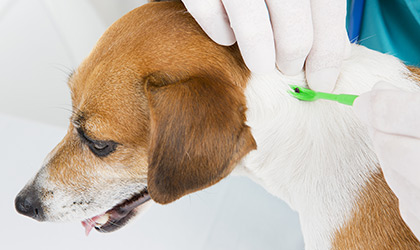
In addition to your unbounded love, care and affection, your pet needs a number of key medical procedures to protect himself and the rest of the animal community. And as a responsible owner, you have an obligation to see such measures through. neglect this, and you could even face the wrath of the law.
The traditional neutering/spaying age for puppies is around 6-9 months, and 8-10 weeks old for kittens. Remember - kittens become sexually active a 5-6 months old. Don't delay!
Micro-chipping
A microchip is a tiny tag that contains all your personal information and is inserted under your pet’s skin. Think of it as your furry friend’s form of identification. As long as your details are kept up-to- date, you can always be contacted if your companion goes walkabouts. Since April 2016, all dogs in England, Wales and Scotland need to be micro-chipped. Failure to do so could result in a £500 fine. Cats Protection and RSPCA have even called for this law to extend to felines, which is testament to its significance. It’s a quick and simple procedure that will only set you back £10-£15, so you really have no excuse! Remember to update details if you move!
Spay/Neutering
As well as doing your bit to alleviate the growing crisis of pet homelessness, spaying (female pets) and neutering (male pets) comes with a host of medical and behavioural advantages.
Vaccinations
Vaccinations protect pets from the risk of infectious diseases – conditions that would otherwise have painful and even fatal ends. The benefit of getting your beloved companion vaccinated extends beyond just protecting his individual needs. When a high percentage of animals are vaccinated in any given area, the protection is called ‘herd immunity’ – a biological phenomenon that limits the rate at which serious disease outbreaks can spread. Fur-real, it’s one of the most conscientious actions you can take as an owner. To find ou
NOTE - Feline Immunodeficiency Virus (FID) There is currently no vaccine for FIV in the UK, although you can reduce the chance of your cat contracting FIV through fighting, by having him neutered. Remember to keep on top of annual vaccinations - failure to keep them up to date can be costly! Rabies - a legal requirement for cats/dogs travelling abroad/returning to the UK
Essential UK vaccinations guide
Kittens (at 9 weeks)
-
Cat flu (Feline herpes virus/ virus feline calicivirus)
-
Feline infectious enteritis
-
Feline leukaemia (FeLV)
Puppies (at 8-10 weeks)
-
Canine distemper
-
Canine Hepatitis virus
-
Canine Parvovirus (Parvo virus)
-
Leptospirosis
-
Consider ‘Kennel Cough’
-
vaccine for dogs, prior to
-
kennelling
To find out more about vaccinations for your furry friends, why not read our guides on vaccinating kittens and vaccinating puppies.
Did you know?
In just 5 years, one un-neutered female cat can be responsible for 20,000 descendants? Terrifying, isn't it!
Medical
-
Spaying your female pet will help her live a longer, healthier life since it can prevent mammary tumours (which are cancerous in 50% of dogs and 90% of cats) and uterine infections. Spaying your pet before her first heat offers the best form of protection against such conditions.
-
Neutering your male pet will protect him against testicular cancer and some prostate issues.
Behavioural
-
Your spayed female won’t go into heat, meaning you won’t have to deal with the incessant yowling and frequent urination.
-
Male cats that have been neutered are far less likely to ‘mark’ furniture.
-
Your male dog will be less likely to roam away from home. An intact male will do just about anything in his power to find a mate, including hatching a mischievous plan to escape from your house. Once free, he risks injury in a fight with other male animals and traffic.
-
Your neutered male may behave better. Your dog may be less likely to mount other dogs, people and inanimate objects once he’s been neutered. Some aggression problems may be avoided altogether through early neutering.
You Might Also Like

Keri
Keri Filtness has worked in the Nutrition Industry for 19 years. She is regularly called upon for her professional comments on health and nutrition related news. Her opinions have been featured by BBC3, Prima, Vitality, The Mirror, Woman’s Own and Cycling Weekly, amongst others. She has also worked one to one with journalists, analysing their diets and health concerns and recommending changes and additions, where appropriate.
View More



